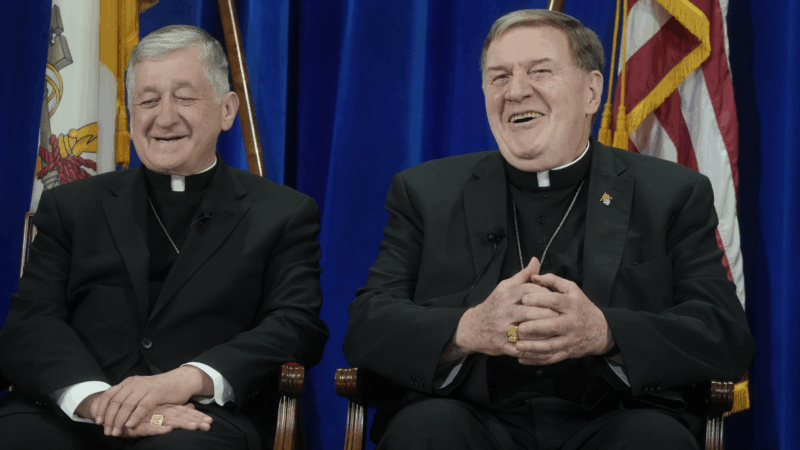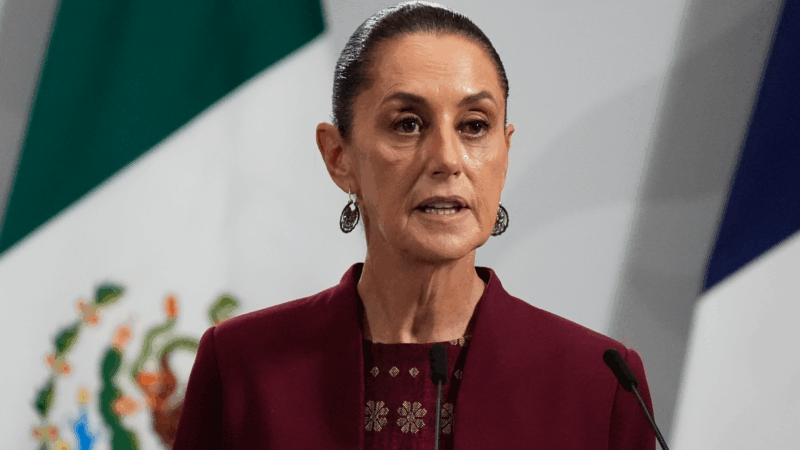Meet the Syrians behind the music that inspired a revolution

HOMS, Syria — His face is everywhere in Syria. It’s plastered on the country’s new flags, on sweaters and on the side of buses.
His voice, untrained and unfiltered, is ubiquitous, too: used in cellphone ringtones and blared from loudspeakers.
His name is Abdel Basset al-Sarout. Once the goalkeeper for the national youth soccer team, at 19 years old, he became one of the best-known protesters demonstrating against Syria’s autocratic Assad regime.
Only now, with ruler Bashar al-Assad forcibly ousted last December, can Sarout’s singing be played publicly in Syria. Children, some born during the revolution and who memorized his lyrics in secret, belt his songs jubilantly on the streets.
NPR wanted to find out about him — but he was killed in 2019, at age 27, in battle with Assad’s forces.
Traveling in the northern city of Homs earlier this year, however, NPR learned of a man that people said had written Sarout’s songs.
The unlikely revolutionaries
The lyricist is named Ayman al-Masri, 52. He is largely unknown within Syria, despite the popularity of his songs.
Before the revolution began, Masri sold car parts and owned a cake factory. When anti-regime protests began in 2011, he threw himself into organizing demonstrations.
A music-lover and amateur writer, he also began authoring verses for various activists and singers in his hometown Homs, one of the first cities to rise up against the Assad regime.
But Sarout was his best singer.
“Al-Sarout had a rare charisma and kindness,” he says. The hint of a rare smile arches Masri’s lips. “He understood me, and I him … sometimes just from a look in our eyes.”
As he tells it, he and the singer met after Sarout tumbled in through his front door in the revolution’s early days.
It had been around midday; the singer was fleeing government soldiers after a protest. Early in the uprising, Masri’s home in Homs was known a safe haven. Sarout came looking for a place to hide. Masri recognized him immediately as the famous soccer goalkeeper.

Masri had reams of lyrics written, but he was looking for the right person to give voice to them. That very day, in his living room, the two men forged a creative partnership.
If Sarout was the revolution’s saint, Masri was its scribe. He ended up writing all of the singer’s 130 or so songs and chants.
Their most well-known song, “Janna, janna, janna,” — Arabic for “paradise” — became a protest anthem that could rouse thousands of demonstrators at a time.
Its lyrics go:
Heaven, heaven, heaven. Heaven is our homeland.
Oh, our beloved homeland, and its gracious soil
Even your fire is heaven.
The song is now inextricably linked to the Syrian uprising. “I memorized ‘Janna’ in grade two or three, but we did not dare sing it out loud,” says Marwan Jnani, 14. He was born in 2011, the year the revolution began and learned the signer’s most famous song in secret. His parents warned him: “If somebody heard you singing it, they would take you underground, and you would never see the light again.”
Across Homs, protesters linked arms and sang out their defiance through the song, even in the face of regime snipers and artillery strikes that became increasingly common on any pockets of resistance.
“Those days were the pinnacle of happiness, the sweetest of my life,” Masri remembers.

Going underground
As the pair’s renown grew, so did the danger they faced. Regime forces tried multiple times to assassinate the two men. Masri says they never spent more than a few nights in any one place, sheltered by sympathetic Syrians who risked arrest for helping them.
In 2012, Assad’s forces began a siege of Homs. The city was known as a bastion of some of the earliest and fiercest resistance against the Assad regime. In retribution, regime forces — assisted by Russian airstrikes — targeted the city with vicious bombardment and street-by-street urban battles.
Most civilians fled as artillery strikes decimated an estimated 60% of buildings and food supplies dwindled. The singer and the songwriter were among the Homs residents who chose to stay, retreating into the warren of alleys in Homs’ old city.
Masri’s lyrics — once triumphant and upbeat — took on a more mournful tone as starvation and death became endemic in Homs. After two of his colleagues were killed in an artillery strike, he wrote the following song, with his own mother in mind.
Oh mother, in a new dress
Celebrate my martyrdom.
I come to you a martyr dressed in the Eid’s garments
And heaven is my new home.
Celebrate and be happy with me, and forgive me for leaving you.
And he continued to collaborate with the singer. He paid to obtain a map of the city’s sewage system. The singer and the songwriter traversed the frontlines of the urban guerrilla war that had consumed the city of Homs by that point, with one half of the city overtaken by regime soldiers and the other half controlled by rebel groups.
The pair had to cross enemy lines through the city’s sewage tunnels, emerging from drainage grates in the dead of night to meet so Masri could give the singer his newest lyrics. Hunger stalked civilians and rebel fighters. Masri says they boiled wool rugs to eat and stripped trees of their leaves for sustenance.
By this time, the two men, once so in synch with one another, had diverged in their views.


Masri, a committed pacifist, believed his pen was his most powerful weapon. Sarout had picked up a gun, become an opposition fighter, and was fixated on freeing Homs from regime control. As his closest friends and family died one by one, the singer increasingly advocated for violence, over singing, as his preferred tool for regime change.
“Abdel Basset had to protect himself. All Syrian people, especially in Homs, were forced to turn to weapons,” says Raed al-Khalid, 34, a former high school soccer teammate of the singer.
Eventually, Sarout was forced to abandon Homs. Right before sneaking out via an underground tunnel, the singer gave a controversial endorsement of the extremist group Islamic State, or ISIS, offering to work with them.
Khalid spent almost seven years fighting alongside Sarout. He watched as his joyful, big-hearted friend grew more weary and more hardened: “Sometimes, he would tell me, I just want to rest. I am so tired. But everywhere he went, people wanted to spend time with him and hear him sing his songs.”

“A chapter is missing”
Khalid says Sarout often prayed that he would die fighting. By the end of the war, his father and four of his five brothers would be killed battling the regime.
In 2019, Sarout got his wish.
“I was the last person to see him alive and to bid farewell to him,” says Mohammad al-Sarout, 24, the singer’s nephew, who became a rebel fighter alongside his uncle in northern Syria. “He was going out, and I told him, be careful; there is a drone in the sky.”
Shortly after, the singer was badly injured in a strike.
Khalid, his former teammate, was among the soldiers who evacuated him to a hospital in Turkey for treatment, but Sarout died of his injuries the next day, aged 27.
Khalid buries his face in his hands when he thinks about his friend’s last moments, his sadness mixed with joy at witnessing last December the end of the regime that they sacrificed so much to topple.
“There is an entire chapter to this story that is still missing,” says Khalid. “Abdel Basset is missing.”


Masri, the lyricist, is now a songwriter without his singer. Today, he wanders the city where he and the singer made their name and sees flickers of the past.
“Sarout’s scent, his presence, is everywhere in Homs,” Masri says surveying the destroyed streets, most of which still have not been rebuilt since the regime’s siege of the city. “There is no street here that we have not walked down together.”
The regime demolished much of the singer’s former home — and that of his uncle’s nearby.
But the memory of the singer is very much alive on his old street. As we approach what remains of his family house, a gaggle of children — some born after he died — surround us. I asked them who lived here, and giggling, they reply immediately: “Abdel Basset al-Sarout.”

Masri is with us, immersed in his own memories. He points to a corner of the house, next to a missing window; that was where the singer would be sitting, waiting to greet his songwriter, every time he entered, he says.
On this visit, Masri is carrying a spiral-bound A4-size notebook where he hand wrote most of the first songs the singer sang. There is no written anthology of their songs, nor does his name ever appear in credits as their author, but this thin, dogeared notebook is where his connection to his favorite singer is preserved.
Opening the notebook, Masri starts to recite one of his old verses. The wall has been blown wide open, so he faces the setting sun. Nearby, a mosque begins its call to prayer.

Oh mother, my brothers, my friends, and most of my companions have gone ahead.
We will live on, for this world is fleeting.
Dress me in the robe of martyrdom and send me off in honor.
Now with the regime he opposed gone, Masri says has a lot to live for again. He has started writing again since the regime fell, he tells me. His new songs are different; they are about life and hope and rebuilding.
Transcript:
SCOTT DETROW, HOST:
NPR’s Emily Feng recently wrapped up a reporting trip to Syria, and as Syrians celebrated the end of Bashar al-Assad’s regime, she kept seeing one man’s face everywhere. She wanted to know who he was, so she and NPR’s Jawad Rizkallah went looking.
EMILY FENG, BYLINE: I saw him on Syrian flags, on posters, on the sides of buses and cars. And then I heard him everywhere, too…
(SOUNDBITE OF ARCHIVED RECORDING)
ABDUL BASET AL-SAROUT: (Singing in non-English language).
FENG: …In cellphone ringtones and on loudspeakers. And I learned his name – Abdul Baset al-Sarout.
UNIDENTIFIED CROWD #1: (Singing in non-English language).
FENG: People sang his songs to me in jubilation on the streets, even children.
(SOUNDBITE OF MUSIC)
AL-SAROUT: (Singing in non-English language).
FENG: Al-Sarout was already beloved for playing on Syria’s youth soccer team, and his untrained voice channeled the public’s anger into action and into protests against the old regime run by the Assad family…
UNIDENTIFIED CROWD #2: (Singing in non-English language).
FENG: …Even when government snipers started firing on demonstrators. Al-Sarout became the poster child of the revolution. I wanted to find out more about him, except he was killed in 2019. But I heard a name when I visited the northern Syrian city of Homs – a man people said wrote Al-Sarout’s songs.
AYMAN AL-MASRI: (Non-English language spoken).
UNIDENTIFIED PERSON: On purpose.
FENG: And so we tracked him down.
AL-MASRI: I’m Ayman al-Masri.
FENG: This is Ayman al-Masri. He’s a sedate man with heavily lidded eyes. Before the revolution, he sold car parts and owned a cake factory. But when antigovernment protests kicked off in 2011, he became a revolutionary and a writer.
AL-MASRI: (Speaking Arabic).
FENG: He started penning chants and lyrics for activists. “I wrote for a lot of singers,” al-Masri tells me.
AL-MASRI: (Non-English language spoken).
FENG: “But al-Sarout had a special charisma and kindness.” The hint of a rare smile arches al-Masri’s lips. “He understood me, and I, him,” al-Masri says.
(SOUNDBITE OF ARCHIVED RECORDING)
UNIDENTIFIED CROWD #3: (Singing in non-English language).
FENG: If al-Sarout was the revolution’s saint, al-Masri was its scribe. Al-Masri wound up writing all of the singer’s some 130 chants and songs, including this one.
(SOUNDBITE OF ARCHIVED RECORDING)
AL-SAROUT: (Singing in non-English language).
FENG: “To glory and dignity and chivalry,” Al-Sarout sings. Homs, his beloved city, will save Arab honor.
(SOUNDBITE OF FOOTSTEPS)
FENG: The pair met when the singer quite literally walked through this store, al-Masri’s former home in central Homs. Al-Masri remembers it had been around midday. The singer was fleeing government soldiers after a protest.
AL-MASRI: (Non-English language spoken).
FENG: Al-Masri’s home in the early days of the revolution was known as a safe haven, and so al-Sarout stumbled in, looking for a place to hide. Al-Masri recognized him immediately as Syria’s famous soccer goalkeeper.
AL-MASRI: (Non-English language spoken).
FENG: Al-Masri said, at that point, he had a bunch of lyrics, but he’d been looking for the right person to give voice to them. And so, on that very day, in his living room, the two men forged a creative partnership. Today, the house where they met is a bombed-out shell.
We’re standing outside of a shelled house, bullet marks on the walls. It used to be pink, but the paint has faded now.
It was struck and raided several times by Assad’s forces. Everything al-Masri once owned went up in flames. Later, the regime destroyed his cake business as well, in retaliation for his lyrics.
AL-MASRI: (Speaking Arabic).
FENG: We walked the streets of Homs with al-Masri. He showed us where he and al-Sarout protested and sang, despite numerous assassination attempts.
AL-MASRI: (Non-English language spoken).
FENG: “Those days were the pinnacle of happiness, the sweetest of my life,” al-Masri tells me. Al-Masri and the singer became famous for their music, but they had to go into hiding.
AL-MASRI: (Non-English language spoken).
FENG: Al-Masri says they never spent more than a few nights in any one place. Then they went underground – literally.
AL-MASRI: (Non-English language spoken).
FENG: They paid to obtain a map of the city’s sewage system. The two traversed the front lines of the urban guerrilla war that had consumed the city of Homs by that point. They crossed enemy lines through the city’s sewage tunnels, emerging from grates in the dead of night to meet so al-Masri could give al-Sarout his newest lyrics. Here they are practicing together in 2013…
(SOUNDBITE OF ARCHIVED RECORDING)
AYMAN AL-MASRI AND ABDUL BASET AL-SAROUT: (Singing in Arabic).
FENG: …Holed up together during the siege of Homs, a major offensive that laid waste to much of the city. Around then, al-Masri says the two men who had once been so in sync started to diverge.
AL-MASRI: (Non-English language spoken).
FENG: Al-Masri, a committed pacifist, believed his pen was his most powerful weapon, but by 2012, al-Sarout had picked up a gun. He’d decided to become an opposition fighter. Here’s his childhood friend and former teammate, Raed el-Khalid.
RAED EL-KHALID: (Non-English language spoken).
FENG: El-Khalid says al-Sarout saw no other way to resist a regime that was increasingly murderous.
EL-KHALID: (Non-English language spoken).
FENG: El-Khalid spent almost seven years fighting alongside al-Sarout. He watched as his joyful, big-hearted friend tired and hardened. Al-Sarout struggled with the death and destruction, but he increasingly advocated for violence over singing as his preferred tool for regime change.
EL-KHALID: (Non-English language spoken).
FENG: El-Khalid says al-Sarout often prayed that he would die fighting. His father and five brothers had all been killed. In 2019, al-Sarout got his wish. He’d been fighting in northern Syria when he was badly injured in a drone strike. El-Khalid was among the soldiers who evacuated him to Turkey for treatment. Abdul Baset al-Sarout died of his injuries the next day. He didn’t live to see the revolution he’d sung for succeed.
EL-KHALID: (Non-English language spoken).
FENG: El-Khalid did, but in his joy, he feels like there’s an entire chapter still missing, he says. Al-Sarout is missing, he says. And al-Masri, the lyricist, is now a songwriter without his singer. Today, he wanders Homs and sees the past.
AL-MASRI: (Non-English language spoken).
FENG: “Al-Sarout’s scent, his presence, is everywhere in Homs,” al-Masri says. “There is no street here that we have not walked down together.”
We get in a car and head to what remains of the singer’s family home.
JAWAD RIZKALLAH, BYLINE: This is the house here.
FENG: The one that the kids are playing on?
RIZKALLAH: Yes.
FENG: The regime destroyed much of it, but the memory of al-Sarout is very much alive here. A gaggle of children, some born after al-Sarout died, surrounds me as I approach. Who lived here? – I ask them.
UNIDENTIFIED CHILD #1: Abdul Baset.
UNIDENTIFIED CHILD #2: Abdul Baset.
FENG: Abdul Baset al-Sarout, they say. Al-Masri is next to me. He’s carrying a worn, spiral-bound A4 notebook – the notebook where he handwrote most of the first songs al-Sarout sang.
AL-MASRI: (Non-English language spoken).
FENG: Opening his notebook, he reads one of his and al-Sarout’s chants. The wall’s been blown open, so we face the setting sun.
AL-MASRI: (Non-English language spoken).
FENG: “My companions have gone ahead of me,” he recites. “We will live on, for this world is fleeting.” Al-Masri has started writing again since the regime fell, he tells me. His new songs are different, though. They’re about life and hope and rebuilding.
(SOUNDBITE OF MUSIC)
AL-SAROUT: (Singing in non-English language).
FENG: Emily Feng, NPR News, Homs, Syria.
(SOUNDBITE OF MUSIC)
UNIDENTIFIED SINGER: (Singing in non-English language).
AL-SAROUT: (Singing in non-English language).
Indiana completes undefeated season and wins first national title, beating Miami
Indiana bullied its way into the history books Monday night, toppling Miami 27-21 to put the finishing touch on a rags-to-riches story, an undefeated season and the national title.
Top U.S. archbishops denounce American foreign policy
The three most-senior cardinals leading U.S. archdioceses issued the rebuke in a joint statement on Monday, saying recent policies have thrown America's "morale role in confronting evil" into question.
Italian fashion designer Valentino dies at 93
Garavani built one of the most recognizable luxury brands in the world. His clients included royalty, Hollywood stars, and first ladies.
Sheinbaum reassures Mexico after US military movements spark concern
Mexican President Claudia Sheinbaum quelled concerns on Monday about two recent movements of the U.S. military in the vicinity of Mexico that have the country on edge since the attack on Venezuela.
Trump says he’s pursuing Greenland after perceived Nobel Peace Prize snub
"Considering your Country decided not to give me the Nobel Peace Prize… I no longer feel an obligation to think purely of Peace," Trump wrote in a message to the Norwegian Prime Minister.
Can exercise and anti-inflammatories fend off aging? A study aims to find out
New research is underway to test whether a combination of high-intensity interval training and generic medicines can slow down aging and fend off age-related diseases. Here's how it might work.







